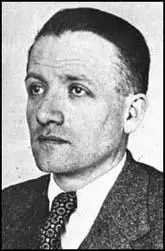Henri Frenay

Henry Frenay was born in Lyons, France in 1905. He studied at the Centre of Germanic Studies in Strasbourg before joining the French Army. He had reached the rank of captain in the Second World War and was captured at Vosges during the German's Western Offensive.
Frenay escaped from a prisoner of war camp in Alsace on 27th June, 1940. He made his way to Marseilles and was at first a supporter of Henri-Philippe Petain and the Vichy government. After becoming disillusioned with Petain and although he remained strongly anti-Communist, he joined the French Resistance in February 1941. This included publishing several underground newspapers, such as Les Petities Ailes and Vérités. Frenay was also instrumental in the formation of Combat in November, 1941.
In 1942 Frenay entered talks with Jean Moulin about the possibility of uniting all the resistance groups working in France. After much discussion Moulin persuaded the eight major resistance groups to form the Conseil National de la Resistance (CNR). This included Frenay's Combat as well as Jean-Pierre Lévy (Francs-Tireur), Liberation (Emmanuel d'Astier), Front National (Pierre Villon), Comité d'Action Socialiste (Pierre Brossolette) and Armée Secrete (Charles Delestraint).
When the Gestapo captured Jean Moulin and Charles Delestraint, Frenay escaped to Algiers. In November 1943, General Charles De Gaulle appointed Frenay as minister of prisoners, deportees and refugees.
In 1944 Frenay returned to France with De Gaulle and served in his first government after the liberation. His autobiography, The Night Will End: Memoirs of a Revolutionary (1976). Henry Frenay died in 1988.
Primary Sources
(1) Henry Frenay was one of those members of the French Resistance who was highly critical of Charles de Gaulle.
General de Gaulle decided alone, without taking the advice of any of us, without listening to our observations or criticisms, to give a single man entire responsibility for liaison with the Resistance and in fact for its direction.
(2) Henry Frenay explained in a letter to Alban Vistel why he had decided to withdraw from politics after the Second World War.
I have renounced all active political life. My experience taught me that the rules of the political game excluded any possibility of friendship between men. Rather than lose my friends, I prefer to abstain. For me, friendship is the essence of existence.
